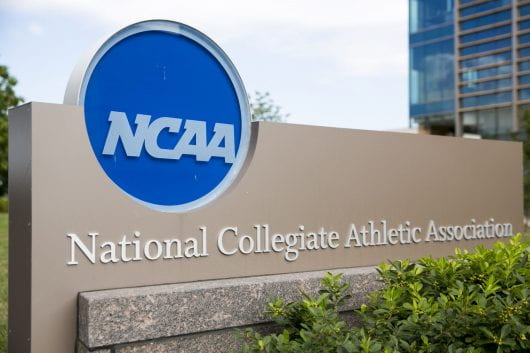
A logo sign outside of the headquarters of the National Collegiate Athletic Association (NCAA) in Indianapolis, Indiana. Credit: Courtesy of TNS
An NCAA committee will vote on granting an extra year of eligibility to winter and spring athletes who had their seasons cut short by the COVID-19 pandemic Monday.
The NCAA Division I Council Coordination Committee released a statement March 13 that said spring athletes should receive eligibility relief.
“Council leadership agreed that eligibility relief is appropriate for all Division I student-athletes who participated in spring sports,” the statement reads. “Details of eligibility relief will be finalized at a later time. Additional issues with NCAA rules must be addressed, and appropriate governance bodies will work through those in the coming days and weeks.”
The committee issued a waiver this past Friday that allows schools to reimburse student-athletes for money spent toward foreign trips and official or unofficial visits, and the same release said the committee supports allowing schools to make their own decisions on eligibility relief.
Ohio State athletic director Gene Smith publicly stated his support for the cause on a conference call with the media March 13.
“I am definitely in support of an extra year or semester of eligibility for our spring sport athletes,” Smith said. “I haven’t looked at the winter sports. My assumption is off the top of my head I would be supportive of that as well.”
The committee will also vote on how to move forward with winter athletes’ eligibility, given that most regular seasons were complete but most postseasons were not, including the Big Ten tournament and the NCAA Tournament.
Smith also detailed some of the issues that will have to be addressed in giving an extra year of eligibility by the NCAA Division I Council Coordination Committee on the conference call.
“There are a number of different issues that need to be worked out, taking into consideration the diversity of our membership. Bottom line is we need to do what’s right for the student-athlete,” Smith said.
Some of the hurdles included roster sizes for the teams, financial aid and scholarship exemptions, academics — especially for graduating seniors — and the financial impacts on the institutions.
“Student-athletes need to know one way or the other, and coaches need to be a part of that process so that they can ultimately plan relative to recruiting and roster management,” Smith said.


